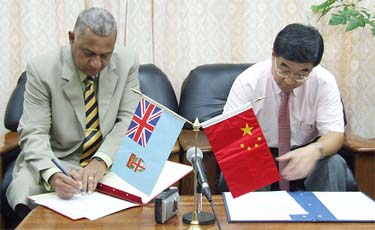The quick translation I’ve seen of the article has some equally colourful language claiming the report ‘recklessly conjectured’ about the motives behind China’s aid giving in the region and ‘sought to foment discord’.
These responses were strange because the reports have several positive things to say about China. The 2008 version, which reported aid flows from 2005 to 2007, argued against the China ‘threat discourse’ (Terence Wesley-Smith provides a good rebuttal of the idea here [pdf]). And both the 2008 and 2009 versions point out the benefit of having a new major donor in the region, able to deliver much needed low-cost infrastructure.
The reports do contain a number of criticisms of China’s aid program though and these, no doubt, were what China objected to. The latest version argues that China’s aid giving lacks a long-term focus – the legacy of its long-running battle for diplomatic recognition with Taiwan. It argues that the recent diplomatic truce between China and Taiwan offers China the opportunity to refocus its aid program on longer-term development objectives that also better suit its medium and long-term interests in the region.
It also suggests (the Global Times piece says ‘demands’) some fairly benign recommendations, including that attempts be made to better coordinate donor assistance in the region to reduce strain on Pacific bureaucracies and reduce duplication.
At the most recent Pacific Islands Forum leaders adopted [pdf] the ‘Cairns compact on strengthening development coordination in the Pacific’ to work towards just such an objective. According to the compact:
‘The key objective of this compact will be to drive more effective coordination of available development resources from both Forum Island Countries and all development partners, centred on the aim of achieving real progress against the MDGs.’
Unfortunately China hasn’t exactly jumped at the idea. In an interview with Rowan Callick, Wang Yongqiu, from China’s Foreign Ministry said: ‘We feel it is unnecessary to accept this multilateral co-ordination mechanism, but we need time to study it.’
His excuse for ignoring the call from island leaders to coordinate aid and reduce duplication suggested he wasn’t exactly across the problem: ‘All the aid projects should be received by the government, and it can’t receive the same project — for instance, road construction — from two different donors.’
China often says its aid is responsive to the requests of recipients, but not in this case apparently.
Fergus Hanson is a Research Fellow with the Lowy Institute.

